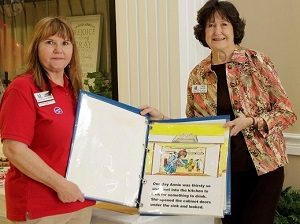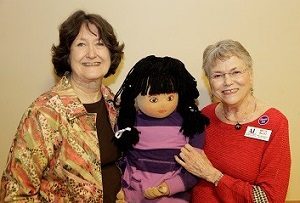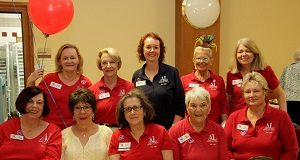


2018 marks the 30th year for Poison Information-Always Ask, one of nine philanthropic programs of Assistance League of Montgomery County. This educational program, developed in 1988 by Assistance League members Linda Deluca and Ann Johnson, was designed to teach preschool children and their parents about poisonous substances. The original program had a story, a game, and a song. Two dolls, Annie and Ted and their dog, Sam, were the main characters of the story. The game involved teaching what is YUK and what is YUM. The children were given a bag with crayons and a coloring book of the “Always Ask” story in both English and Spanish, a poison control sticker, and poison control pamphlets.
This year, Poison Information- Always Ask has updated the storybook for the third time in 30 years. Debbie Jensen Ballard, who wrote the new story, read it to the members of Assistance League of Montgomery County. She used a puppet named Ted and the newly illustrated story boards. Anne Camero, coordinator of the game, played the game with the members. The new story boards were illustrated by Joyce Isenbarger and Lisa Waddell, members of Assistance League. The updated story is designed to be more appealing to children and parents in the 21st century. In 2018, household products continue to rank in the top 5 for the most common poisonous exposures for children under five. Now there are laundry pods that look like candy, hand sanitizers that smell like fruit, and medicines that look like gummy bears. The updated story also reflects some of the changes in our culture. The drawings look more like the animations that young children like to watch on TV, and the parents call Poison Control on their cell phones. Instead of a sticker to put by the phone, volunteers encourage parents to put the Poison Control number (1-800-222-1222) in their cell phone contact list.
On March 26th, the committee hosted a reception that honored the women who have served on this committee. Dot Anderson, Chairman, welcomed members and guests. Betty Blott, member of the 1988 committee, reminisced about presenting the “Always Ask” program to a National Conference and also dressing as Annie, the doll who is the main character in the story presented to the children. Eugenio Alvarez, representing the Southeast Poison Center in Galveston, thanked the committee for helping educate the community about poisonous substances.
In the past 5 years, this successful program has enabled the committee to teach 33,000 children and their parents about poisonous substances.
